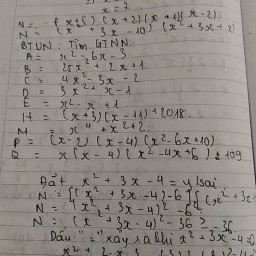a, \(3^{2x+2}=9^{10}\\ 3^{2x+2}=\left(3^2\right)^{10}\\ 3^{2x+2}=3^{20}\\ \Rightarrow2x+2=20\\ \Rightarrow2x=18\\ \Rightarrow x=9\)Vậy x = 9
b, \(3^{3x}=27^{13}\\ 3^{3x}=\left(3^3\right)^{13}\\ 3^{3x}=3^{39}\\ \Rightarrow3x=39\\ \Rightarrow x=13\)Vậy x = 13
c, \(2^x=4^6\cdot16^3\\ 2^x=\left(2^2\right)^6\cdot\left(2^4\right)^3\\ 2^x=2^{12}\cdot2^{12}\\ 2^x=2^{24}\\ \Rightarrow x=24\)Vậy x = 24
d, \(2^x=32^5\cdot64^6\\ 2^x=\left(2^5\right)^5\cdot\left(2^6\right)^6\\ 2^x=2^{25}\cdot2^{36}\\ 2^x=2^{61}\\ \Rightarrow x=61\)Vậy x = 61
a) \(3^{2x+2}=9^{10}\)
=> \(3^{2x+2}=\left(3^2\right)^{10}\)
=> \(3^{2x+2}=3^{20}\)
=> \(2x+2=20\)
=> \(2x=20-2\)
=> \(2x=18\)
=> \(x=18:2\)
=> \(x=9\)
Vậy \(x=9.\)
b) \(3^{3x}=27^{13}\)
=> \(3^{3x}=\left(3^3\right)^{13}\)
=> \(3^{3x}=3^{39}\)
=> \(3x=39\)
=> \(x=39:3\)
=> \(x=13\)
Vậy \(x=13.\)
c) \(2^x=4^6.16^3\)
=> \(2^x=\left(2^2\right)^6.\left(2^4\right)^3\)
=> \(2^x=2^{12}.2^{12}\)
=> \(2^x=2^{12.12}\)
=> \(2^x=2^{24}\)
=> \(x=24\)
Vậy \(x=24.\)
Mình làm thế thôi, còn câu d) có mấy bạn làm rồi.
Chúc bạn học tốt!

















